I. Sector Landscape and Current Trends
Healthcare is one of the most critical sectors in any economy. And in situations like the one, we are in currently; the sector comes under the spotlight. Amidst the COVID-19 pandemic, the preventive measures adopted by Governments include maintaining social distancing, avoiding large congregations, and having adequate protective gear.
Given the scenario, within the healthcare sector, there is an increased focus on biotechnology companies engaged in vaccine development, manufacturers and suppliers of medical devices & equipment, pharmaceutical wholesalers, hospitals and clinics, nursing homes and aged-care facilities, among others. Also, hand sanitisers, gloves & face masks, and PPE (personal protective equipment) manufacturers and suppliers have been witnessing massive demand with citizens prioritising prevention from the infectious disease. The need for these products has increased the importance of pharmacies that have been functional amid the lockdown.
Increasing role of Pharmaceutical Wholesalers
Pharmaceutical wholesalers play a critical role in the supply chain and act as middlemen between the drug manufacturers and the retail pharmacies. The wholesalers combine manufacturer orders, deliver medicinal products to retail pharmacies, and process returns.
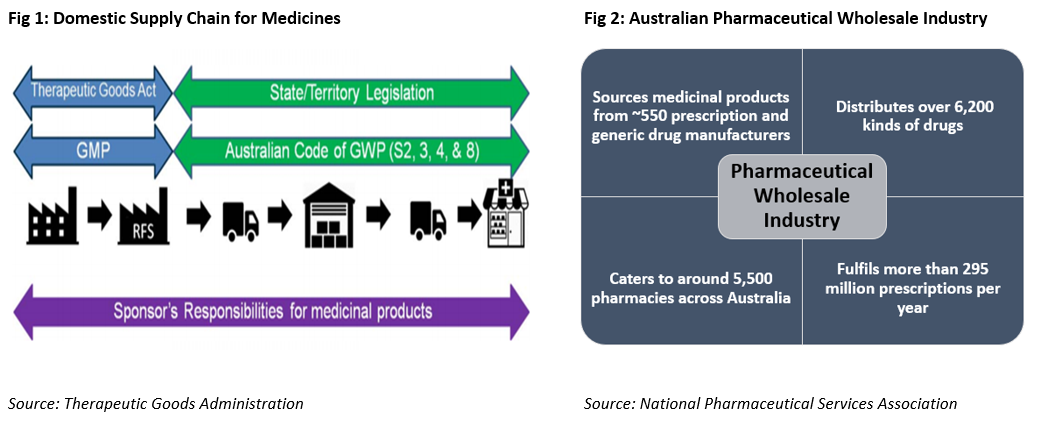
The wholesalers play an integral part in the supply chain and offer the following benefits:
- Ensure quick access to medicinal products, usually within a day.
- Provide an option of delivering essential and emergency medicines through pharmacies rapidly.
- Offer competitive alternatives to pharmacists.
- Maintain quality, efficiency, and safety guidelines within the supply chain.
- Assure that the supply of drugs is affordable both to the patients and the Government.
With the understanding of the role of pharmaceutical wholesalers, let us look at some of the challenges plaguing these players.
Challenges for the Pharmaceutical Wholesalers
In the current unprecedented situation, the Australian Government has taken several steps to ensure that its citizens are safe and have a minimal chance of getting infected by the coronavirus. Restrictions on movement and maintaining apt distance from each other has proved to be beneficial in containing the spread. However, it has had a significant impact on the economy and several businesses, including the wholesale and distribution industry.
In Australia, the manufacturing of pharmaceutical products is limited, and the country is heavily reliant on imports to meet its demand. According to a report by the Institute for Integrated Economics Research, Australia imports ~90 per cent of its medicines, and thus, any event that leads to a global crisis and affects the pharmaceutical supply chain hits the economy extremely hard.
The Australian pharmaceutical wholesale industry has faced the following challenges:
- An extraordinary surge in demand for prescription and OTC drugs has put pressure on the supply chain.
- With the unexpected demand, the wholesalers faced a shortage of certain medicines.
- The disruption in international freight also impacted the supply chain.
- Panic buying during March led to a demand-supply gap. Also, the stocking of essential medicines affected the equitable distribution.
- Closure of borders has had an impact on the standard delivery of products.
Now let us shift our focus towards the initiatives undertaken by the Government that have had a direct impact on the healthcare system in Australia.
Initiatives by the Australian Government
The Australian Government has and continues to play a significant role in the economy dealing with the threatening pandemic that has tormented the global economy for over three months. The following essential measures have been adopted to support the pharmaceutical wholesale and distribution industry:
- The Home Medicine Service aid offers free monthly delivery of PBS (Pharmaceutical Benefits Scheme) medicines to eligible patients. The funding encourages the patients to order the required drugs without worrying about the additional costs leading to an increase in business for the wholesalers.
- Australian Prime Minister, Scott Morrison announced the formation of a national COVID-19 taskforce that will assist in providing medical equipment and support to healthcare workers.
- Based on an application from NPSA (National Pharmaceutical Services Association), the ACCC granted interim authorisation to pharmaceutical wholesalers. The approval would enable wholesalers to coordinate the distribution, supply, inventory management and import of required drugs, and thus ensure a stable supply chain.
Fig 3: Government Restrictions to Avert Drug Stockpiling
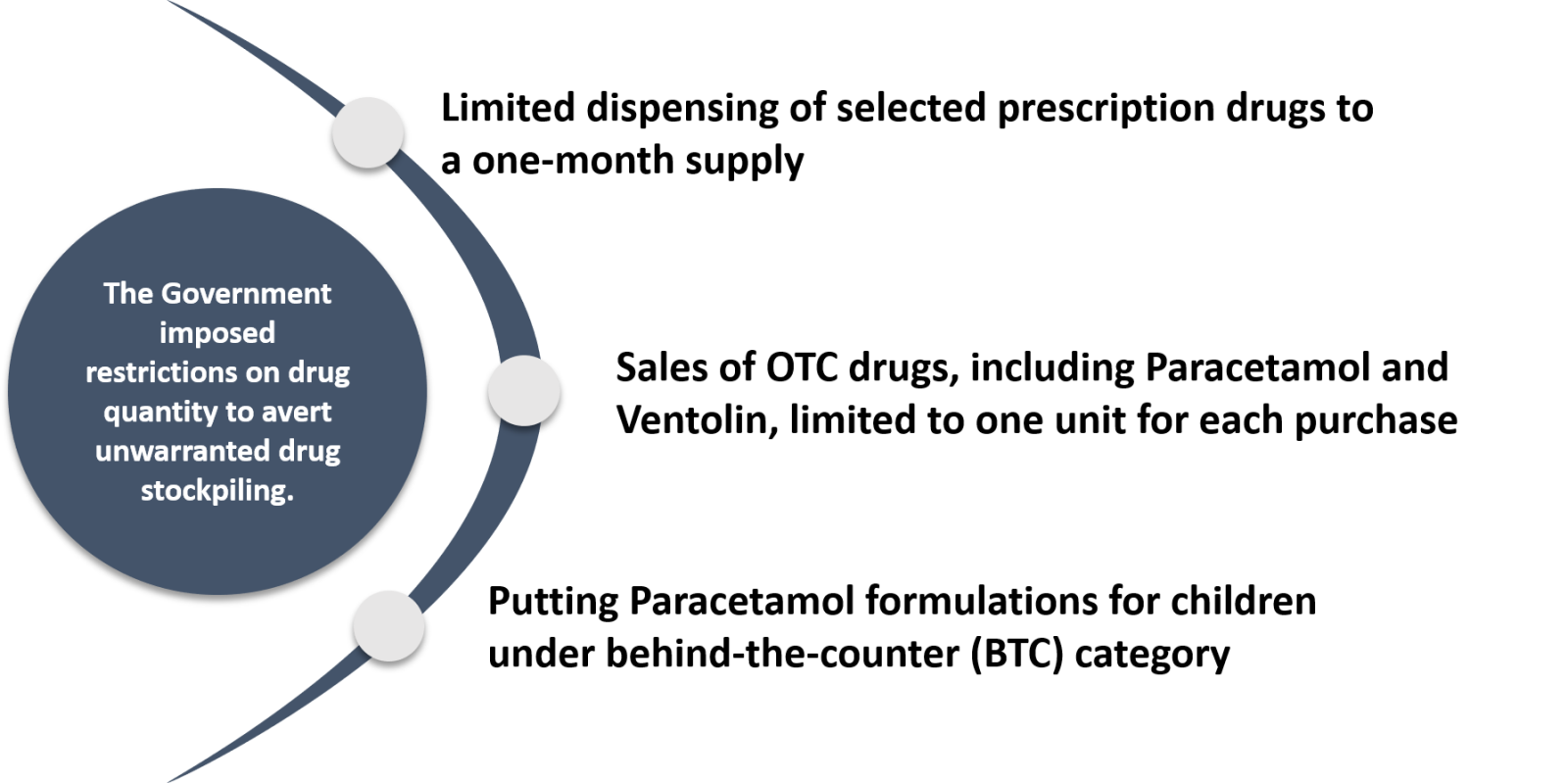
Source: Department of Health, Australian Government
A rise in demand for prescription and generics medicines coupled with the support from the Government and the industry body, NPSA is expected to benefit companies like Sigma Healthcare Limited (ASX: SIG), Australian Pharmaceutical Industries (ASX: API), NPD, and Symbion, a member of EBOS Group Limited (ASX: EBO).
However, the high dependence on imports makes the country vulnerable as the situation is not in its hands entirely. While the conditions are improving with most of the severely affected nations showing a decline in the number of new cases, the pharmaceutical industry, in coordination with the Government, needs to chalk out an appropriate plan in case things take an unexpected turn.
Relating healthcare equipment providers to the COVID thread:
Spike in Demand for Protection Equipment has been witnessed due to Rising Number of Coronavirus Cases, as there is an increased focus on COVID-19 testing
With the number of confirmed coronavirus cases crossing 6,746, the Australian Government has been pushing for more rigorous testing. It is ramping up the number of tests conducted (The country has so far conducted more than 544k tests). As more and more tests are performed there is a greater need for protective gear for healthcare workers including examination and surgical gloves, face masks, sanitisers, goggles and protective clothing.
Fig 4: COVID-19 Australian Status as on 29 April 2020
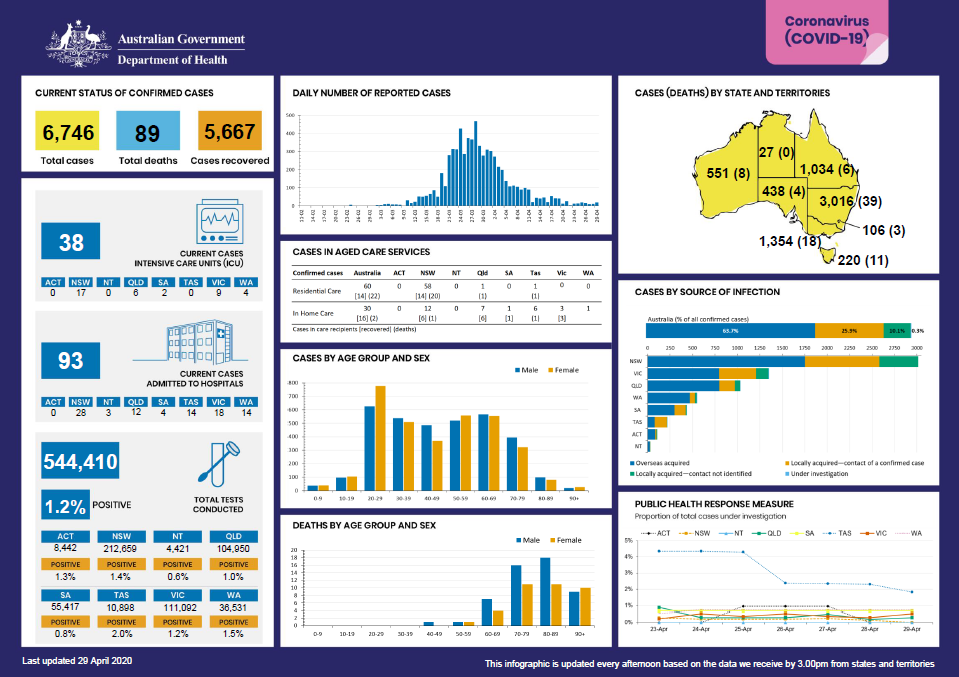
Source: Australian Government Department of Health
With a spurt in demand for the protective equipment, companies including Ansell Limited (ASX: ANN) are witnessing a sudden rise in demand for its protective solutions.
However, for protective equipment manufacturers, the situation poses several challenges, which is depicted by the following figure.
Fig 5: Protective Equipment Manufacturers’ Challenges
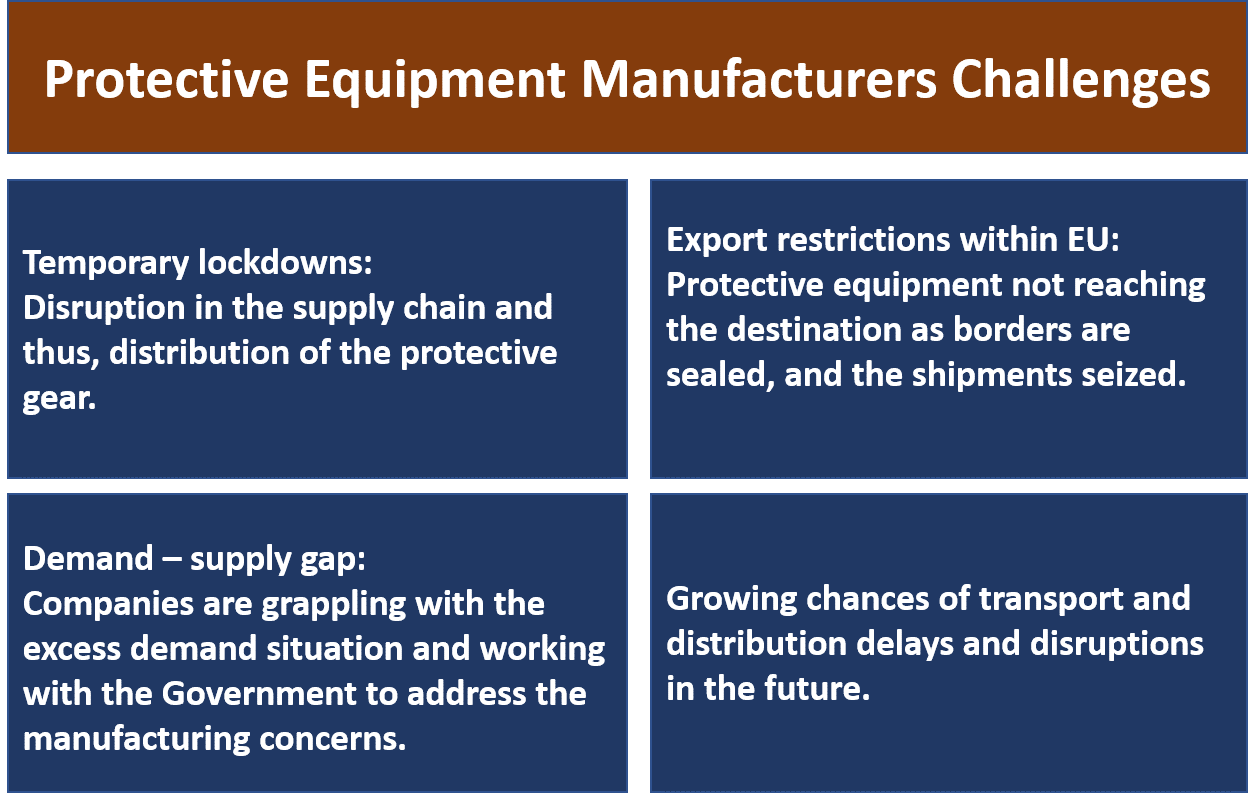
Source: Kalkine Secondary Research
COVID-19 Testing: Support measure from the Government
The Australian Government, to expedite the process of COVID-19 testing, has taken the following measures:
- The Government will allocate ~$170 million to create bulk-billed pathology test for both COVID-19 and flu tests.
- An investment worth $3.3 million to set up a COVID-19 remote POC testing program for Torres Strait Islander communities as well as Aboriginals.
- The Therapeutic Goods Administration (TGA) has implemented a new exemption to permit the swift supply of COVID-19 diagnostic tests for the accredited pathology laboratories across the country.
- TGA has also undertaken an expedited approval process to include COVID-19 tests on ARTG.
- The Government has also proactively raised a tender seeking support from Australian manufacturers to supply components for the COVID-19 test kit.
The Government’s intent to conduct as many COVID-19 tests as possible creates an opportunity for healthcare companies conducting such tests like Sonic Healthcare Limited (ASX: SHL) that is engaged in the designing of medical devices to conduct blood-based rapid testing.
The current blood-based tests for COVID-19 detection are multi-component test kits that are usually only for professional use. These kits need several accessories to conduct the test.
COVID-19 self-tests, when fully operational, is likely to aid community testing, and thus, creating an environment where a lesser number of people need to visit healthcare facilities if they feel the need to get tested. This, in turn, would lower the risk of infection in doctors and the supporting healthcare staff.
As the Australian Government starts to look at the future, contemplating what measures to take to revive the economy, the citizens of the country should thank the Government and the healthcare system of the country. Because of the steps taken by the Government and the proactiveness of the healthcare industry, Australia has dealt with COVID-19 in a way far better than most of the other developed nations. A fatality rate of just 1.3%, as against 7.0% worldwide, and the number of deaths under 100, Australia and its healthcare system have performed admirably. However, there is still a long way to go and the authorities must remain vigilant in times where there is still a lot of uncertainty.
II. Investment Theme and Stocks under Discussion (API, SIG, EBO, SHL and ANN)
There is tremendous amount of focus on the healthcare sector and the various subsectors within, let us now look at five interesting stocks with business focused on either pharma wholesaling or protective gear manufacturing.
1. ASX: API (AUSTRALIAN PHARMACEUTICAL INDUSTRIES LIMITED)
(Recommendation: Speculative Buy, Potential Upside: Low Double Digit, Mcap: A$ 581.3 Million)
Australian Pharmaceutical Industries Limited is involved in the wholesale supply of pharmaceutical products to drugstores and pharmacies. API is also a retailer of health and beauty products via Priceline and Priceline Pharmacy franchise stores and owned Priceline stores in Australia.
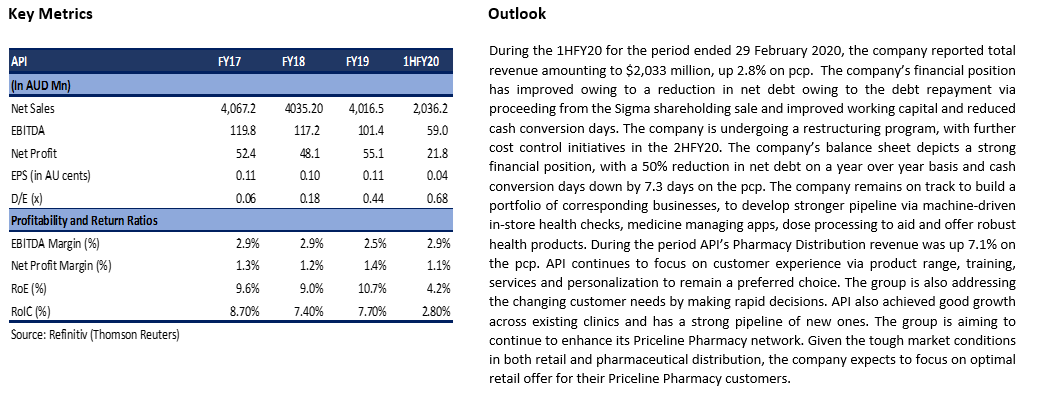
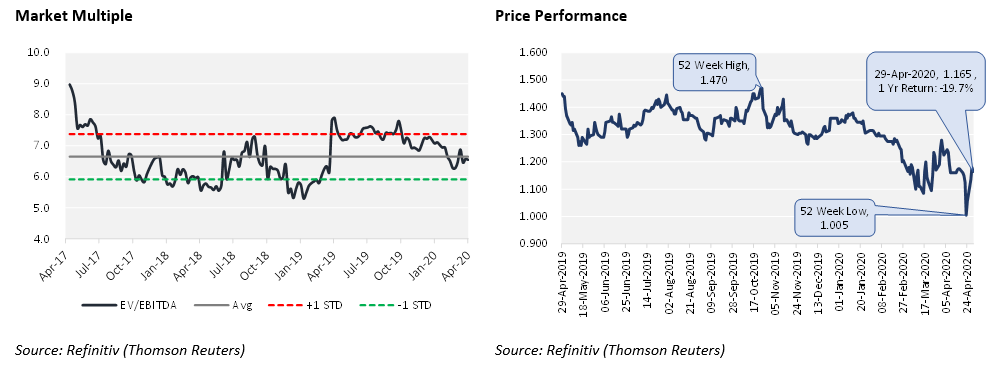
Valuation
Our illustrative valuation model suggests that stock has a potential upside of ~17% on 29 April 2020 closing price.
.png)
2. ASX: SIG (SIGMA HEALTHCARE LIMITED)
(Recommendation: Speculative Buy, Potential Upside: Low Double Digit, Mcap: A$ 625.0 Million)
Sigma Healthcare Limited is one of the top full-line pharmacy wholesalers in Australia and is engaged in the wholesale and distribution of pharmaceutical products. Further, it has been expanding national hospital services business, along with continuous delivering domestic third-party logistics services.
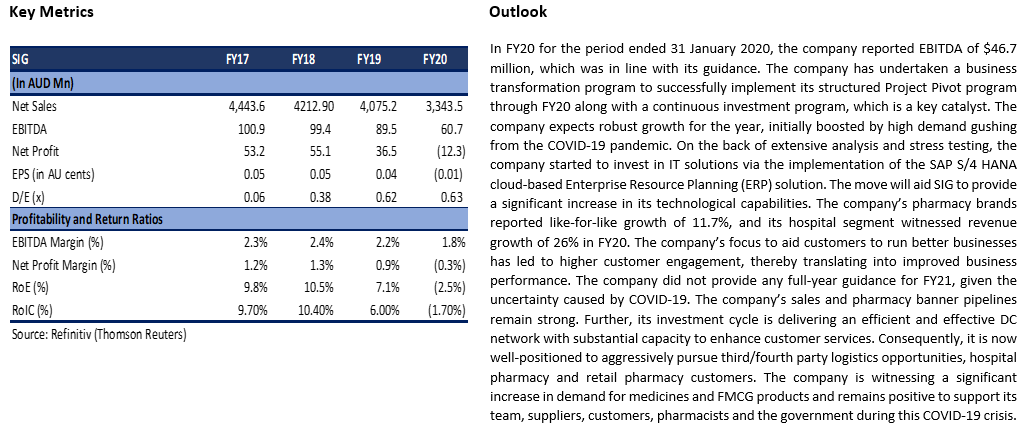
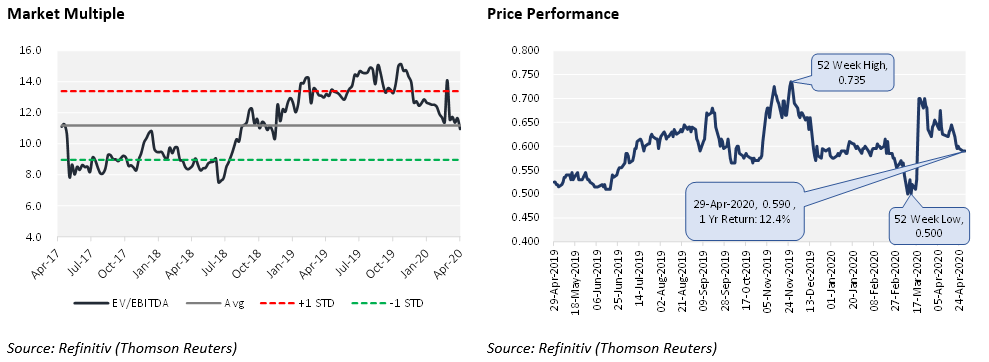
Valuation
Our illustrative valuation model suggests that stock has a potential upside of ~18% on 29 April 2020 closing price.
.png)
3. ASX: EBO (EBOS GROUP LIMITED)
(Recommendation: Buy, Potential Upside: Low Double Digit, Mcap: A$ 3.41 Billion)
EBOS Group Limited is involved in the marketing, wholesale and distribution of medical, healthcare & pharma goods in Australia, along with well-known consumer products & animal care brands.
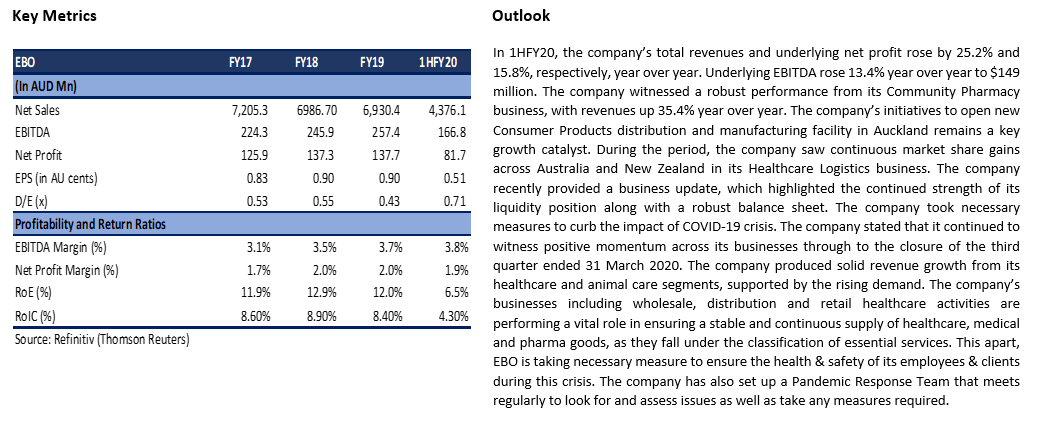
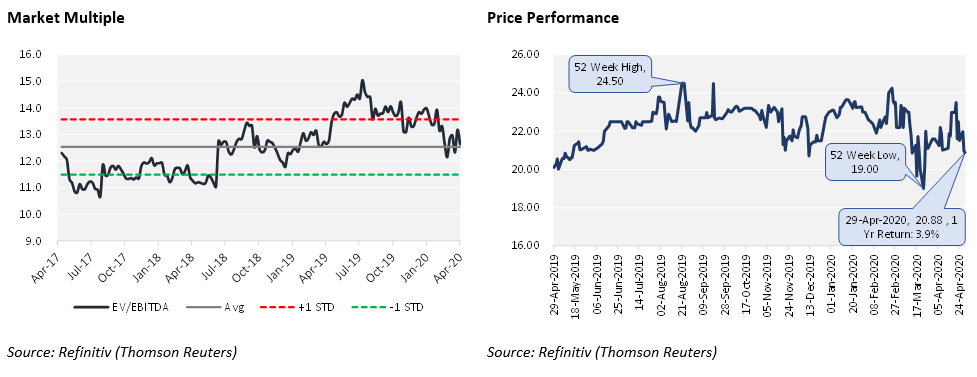
Valuation
Our illustrative valuation model suggests that stock has a potential upside of ~16% on 29 April 2020 closing price.
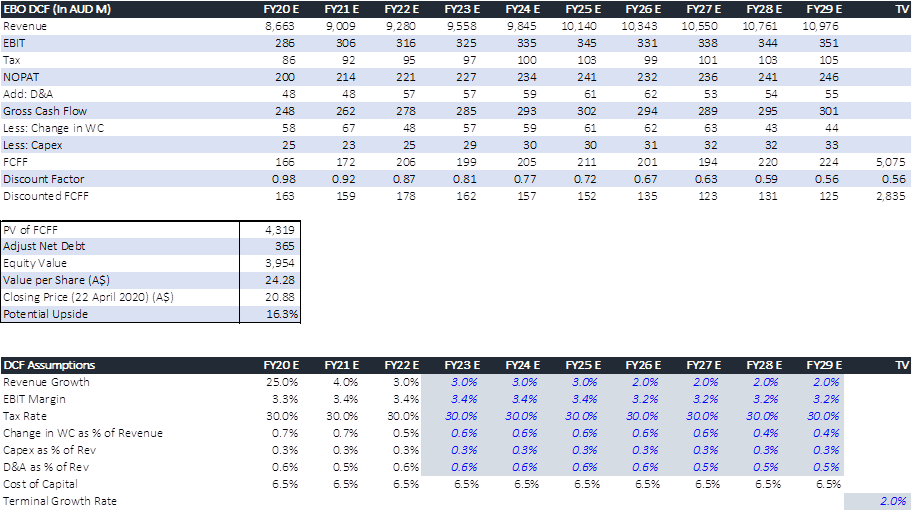
4. ASX: SHL (SONIC HEALTHCARE LIMITED)
(Recommendation: Buy, Potential Upside: Low Double Digit, Mcap: A$ 12.7 Billion)
Sonic Healthcare Limited is a global medical diagnostics company which offers laboratory and radiology services to medical practitioners. The company remains on track to build its growth strategy and has proven its strength in cultural, financial, managerial, and operational space.
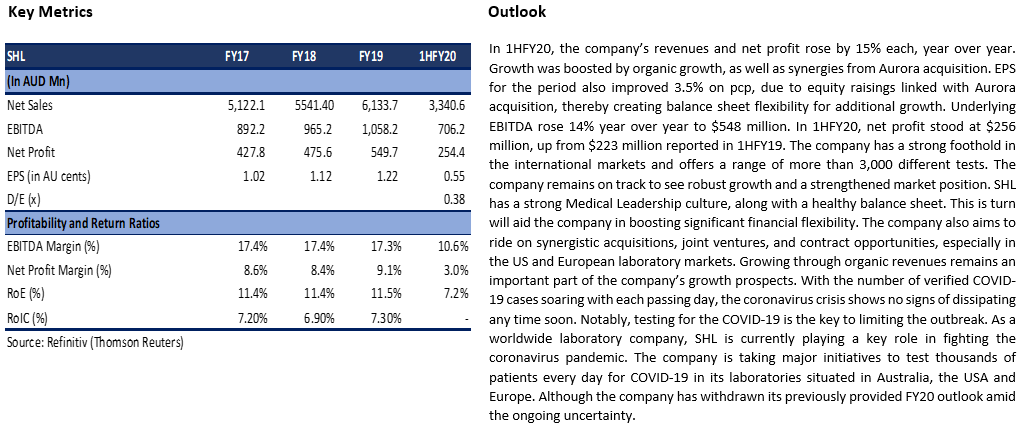
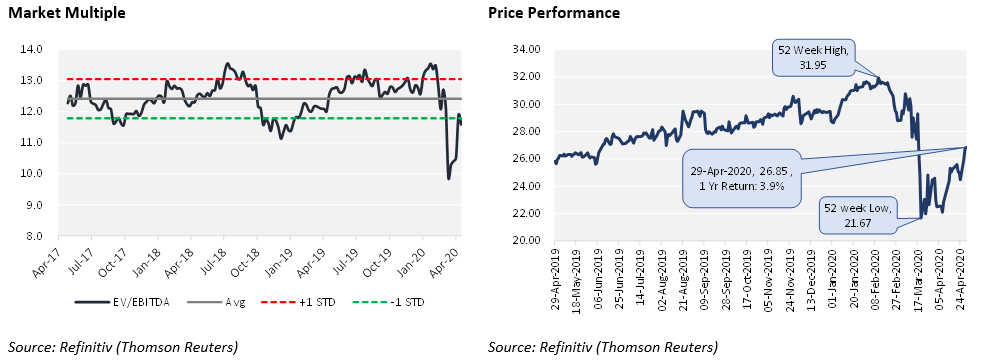
Valuation
Our illustrative valuation model suggests that stock has a potential upside of ~16% on 29 April 2020 closing price.
.png)
5. ASX: ANN (ANSELL LIMITED)
(Recommendation: Hold, Potential Upside: High Single Digit, Mcap: A$ 3.78 Billion)
Ansell Limited offers health and safety protection solutions, which enhances human well-being. The company’s products and services promote confidence in people and aid businesses and workers to operate better.

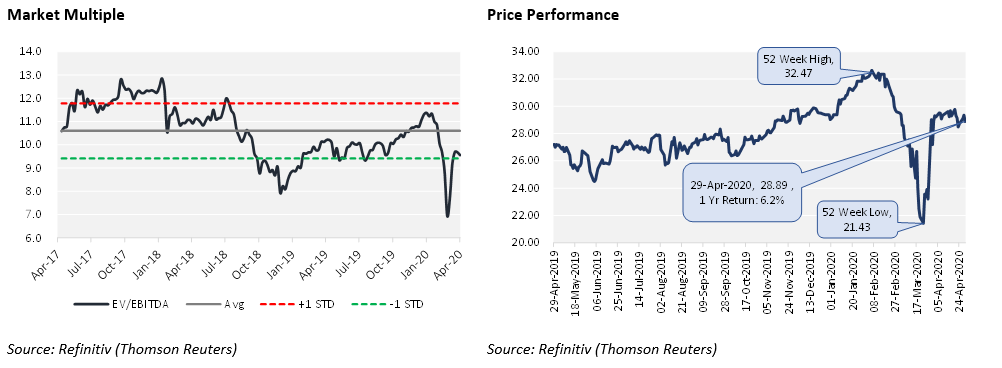
Valuation
Our illustrative valuation model suggests that stock has a potential upside of ~9% on 29 April 2020 closing price.
.png)
Assumptions Rational: Given the exposure to the prevailing crisis situation, companies under discussion may witness certain challenges with regards to operating margins in the near to medium term, while disruption in demand appears to be somewhat resilient. The above forecasts thus take these factors into consideration under the prevailing premise as companies are trying to maintain capex to an extent.
Note: All the recommendations and the calculations are based on the closing price of 29 April 2020. The financial information has been retrieved from the respective company’s website and Refinitiv (Thomson Reuters). All the recommendations are valid on 30 April 2020 price as well.
Disclaimer
The advice given by Kalkine Pty Ltd and provided on this website is general information only and it does not take into account your investment objectives, financial situation or needs. You should therefore consider whether the advice is appropriate to your investment objectives, financial situation and needs before acting upon it. You should seek advice from a financial adviser, stockbroker or other professional (including taxation and legal advice) as necessary before acting on any advice. Not all investments are appropriate for all people. Kalkine.com.au and associated pages are published by Kalkine Pty Ltd ABN 34 154 808 312 (Australian Financial Services License Number 425376). The information on this website has been prepared from a wide variety of sources, which Kalkine Pty Ltd, to the best of its knowledge and belief, considers accurate. You should make your own enquiries about any investments and we strongly suggest you seek advice before acting upon any recommendation. Kalkine Pty Ltd has made every effort to ensure the reliability of information contained in its newsletters and websites. All information represents our views at the date of publication and may change without notice. To the extent permitted by law, Kalkine Pty Ltd excludes all liability for any loss or damage arising from the use of this website and any information published (including any indirect or consequential loss, any data loss or data corruption). If the law prohibits this exclusion, Kalkine Pty Ltd hereby limits its liability, to the extent permitted by law to the resupply of services. There may be a product disclosure statement or other offer document for the securities and financial products we write about in Kalkine Reports. You should obtain a copy of the product disclosure statement or offer document before making any decision about whether to acquire the security or product. The link to our Terms & Conditions has been provided please go through them and also have a read of the Financial Services Guide. On the date of publishing this report (mentioned on the website), employees and/or associates of Kalkine Pty Ltd do not hold positions in any of the stocks covered on the website. These stocks can change any time and readers of the reports should not consider these stocks as personalised advice.
AU
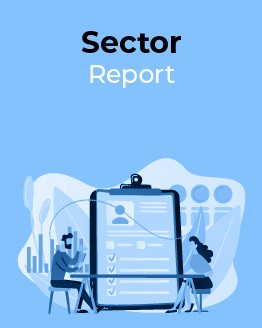






.png)


.png)





.png)


.png)
 Please wait processing your request...
Please wait processing your request...